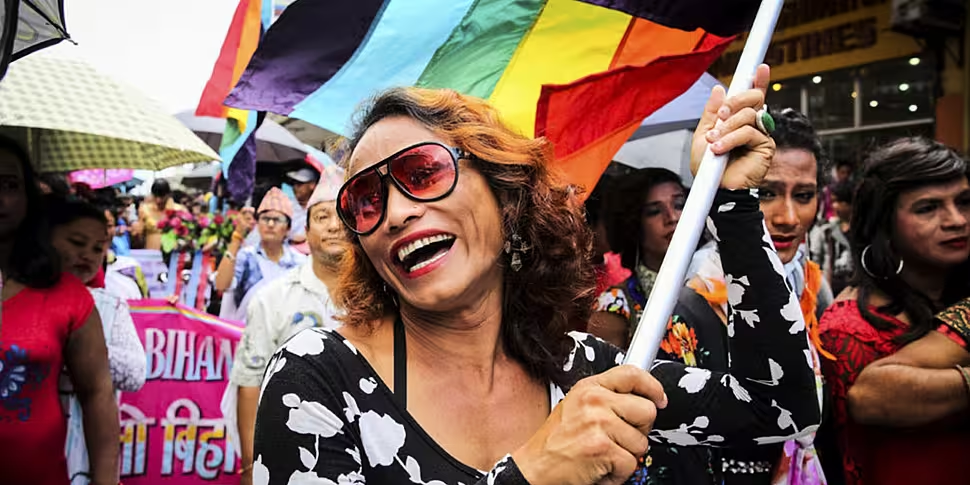The United Nations has said same-sex relations between consenting adults are still criminalised 72 countries and territories.
It comes as Friday marked International Day against Homophobia, Transphobia and Biphobia (IDAHOT).
The day sought to shine a light on discrimination faced by Lesbian, Gay, Bisexual, Transgender, Queer and Intersex people (LGBTQI+).
This year the day focused on justice and protection for all.
The United Nations Development Programme (UNDP) said: "Enacting and enforcing non-discriminatory laws and policies, repealing punitive laws and ensuring access to justice for all are also critical to delivering on the United Nations' (UN) core commitment to leave no one behind."
"Over the past number of decades, justice and protection of LGBTI people has seen significant progress globally.
"Just last year, for example, the Supreme Court of India unanimously declared that all forms of consensual sex between adults to be legal, effectively decriminalising same-sex relations in India.
"Angola repealed anti-homosexuality provisions and banned discrimination based on sexual orientation.
"Pakistan enacted a law protecting the rights of transgender people and, with support from UNDP and our partners, began work on a transgender welfare policy."
Lights off
Rainbow up
Love ON
🏳️🌈🇪🇺
Our headquarters -Berlaymont building- lit up in the colours of the rainbow flag to support International Day against Homophobia, Transphobia and Biphobia.#IDAHOT2019 #IDAHOTB #IDAHOT pic.twitter.com/MMZDkff1yC— European Commission 🇪🇺 (@EU_Commission) May 16, 2019
It said while such progress is welcome, more needs to be done.
It cites statistics that 72 countries and territories still criminalise same-sex relations between consenting adults.
While only 63 countries provide some form of anti-discrimination protection for LGBTI people.
"A number of countries even restrict freedom of speech and association relating to gender and sexual diversity", it added.
Today is International Day against Homophobia, Transphobia and Biphobia calling attention to discrimination suffered by the LGBTI+ community.
We hold the rainbow flag to show our support as no one should be discriminated against because of who they love. #IDAHOT2019 🏳️🌈 pic.twitter.com/ARSIdgsWPY— EU Commission in Ireland (@eurireland) May 17, 2019
Meanwhile, homeless charity Focus Ireland has commissioned a study on LGBTQI+ youth homelessness in Ireland.
In partnership with BeLonG To, the study is currently in its fieldwork phase.
Focus Ireland's research coordinator is Sarah Sheridan.
She said: "International research shows that LGBTQI+ are over-represented in the youth homelessness population - including UK, Canada, UK, USA and Australia.
"Though there are issues and challenges around measurement of the phenomenon in terms of it being under-reported, most studies estimate that up to 40% of young people experiencing homelessness are LGBTQI+.
"International research also shows that family rejection is a key contributing factor for many LGBTQI+ youth entering homelessness.
"Yet despite the recognised risks facing LGBTQI+ youth, there is a lack of homelessness prevention schemes for these young people - such as school-based supports or youth family mediation services with a focus on LGBTQI+ issues.
"Risk is also heightened for these young people as mainstream services may not cater to the needs of these young people, while staff may not be adequately trained around LGBTQI+ support needs or sensitivities."
It comes just a day after Ireland was ranked 17th out of 49 European countries in an annual report on LGBT+ human rights.
Minister @davidstantontd supports ‘Justice and Protection for All’ on International Day Against Homophobia, Biphobia and Transphobia (IDAHOBIT). Working to make a Safe, Fair and Inclusive Ireland. #IDAHOBIT pic.twitter.com/ibjgjBwEbb
— Department of Justice 🇮🇪 (@DeptJusticeIRL) May 17, 2019









